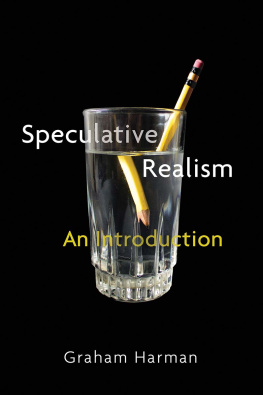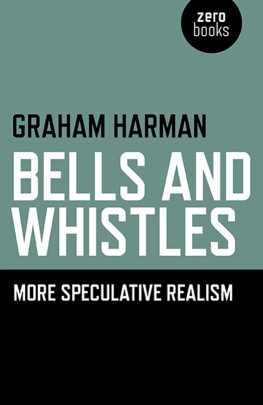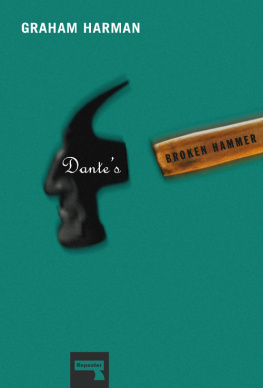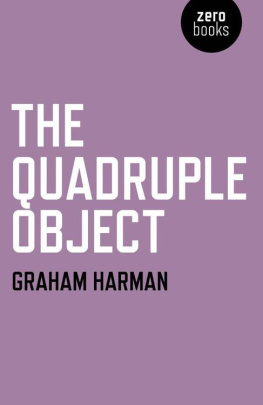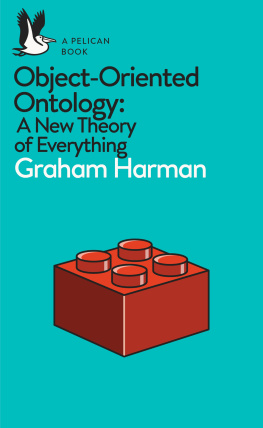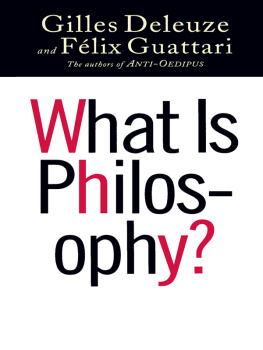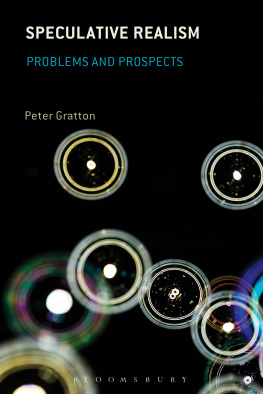Contents
Guide
Pages

Speculative Realism
An Introduction
GRAHAM HARMAN
polity
Copyright Graham Harman 2018
The right of Graham Harman to be identified as Author of this Work has been asserted in accordance with the UK Copyright, Designs and Patents Act 1988.
First published in 2018 by Polity Press
Polity Press
65 Bridge Street
Cambridge CB2 1UR, UK
Polity Press
101 Station Landing
Suite 300
Medford, MA 02155, USA
All rights reserved. Except for the quotation of short passages for the purpose of criticism and review, no part of this publication may be reproduced, stored in a retrieval system or transmitted, in any form or by any means, electronic, mechanical, photocopying, recording or otherwise, without the prior permission of the publisher.
ISBN-13: 978-1-5095-2002-2
A catalogue record for this book is available from the British Library.
The publisher has used its best endeavours to ensure that the URLs for external websites referred to in this book are correct and active at the time of going to press. However, the publisher has no responsibility for the websites and can make no guarantee that a site will remain live or that the content is or will remain appropriate.
Every effort has been made to trace all copyright holders, but if any have been inadvertently overlooked the publisher will be pleased to include any necessary credits in any subsequent reprint or edition.
For further information on Polity, visit our website: politybooks.com
Introduction
Though barely a decade old, Speculative Realism (SR) is already one of the most influential philosophical movements in art, architecture, and the humanities. A number of books have already been written on Speculative Realism in part or as a whole: those of Peter Gratton, Steven Shaviro, and Tom Sparrow come to mind.
Though I relish this assignment, there are two potentially awkward circumstances that should be addressed at the outset. The first is that I am not just the author of this book but also one of its subjects, being one of the four original speakers at the initial SR workshop (along with Ray Brassier, Iain Hamilton Grant, and Quentin Meillassoux), as well as one of the authors most closely associated with the movement. The resulting need to speak about myself from time to time creates a Scylla-or-Charybdis predicament: should I insufferably refer to myself in the first person throughout this book, or even more insufferably in the third person? The solution I have chosen is as follows. When recollecting personal actions such as the giving of lectures or the writing of books, then the first person is the only real option, though I have tried to keep such reminders of authorial presence to a minimum. But when referring to my philosophical position more generally, I will refer to it impersonally as Object-Oriented Ontology (OOO). This entails a certain accidental injustice to my most prominent fellow OOO authors: Ian Bogost, Levi R. Bryant, and Timothy Morton.
The second awkward question concerns the objectivity of this book. The original SR group did not last very long, and there are sharp philosophical and even personal disagreements between some of its members today. Though a total of two SR workshops were held, Meillassoux did not attend the second; he was replaced capably on that occasion by Alberto Toscano, who had moderated the original Goldsmiths event. As far as I know, the reason for Meillassouxs absence from the second meeting was that he wished to emphasize the materialism of his position over the realism built into SRs name. A much bigger issue is that there is a stark opposition between Brassiers wing of SR and my own, to the point that Brassier today rejects even the name Speculative Realism, despite the fact that he coined it himself. His disciple Peter Wolfendale has even published a book of more than 400 pages purporting to demonstrate the intellectual worthlessness of my object-oriented position. In any case, the present book aims to provide as fair a summary of Brassiers position as of Grants and Meillassouxs. While it is inevitable that some of Brassiers devotees will not like my critical presentation of some of his ideas, this is simply a normal occupational hazard of intellectual life.
* * *
On April 27, 2007, an intriguing philosophical workshop was held at Goldsmiths, University of London. Entitled Speculative Realism, it brought together four authors working in the continental (i.e. Franco-German) tradition of philosophy who each gave an hour-long talk, appearing in alphabetical order according to last name. Unlike Brassier, I had enough free time to read the book immediately, and on the basis of my positive report Brassier threw Meillassouxs name into the mix for a joint event as well. Enthusiastic organizer that I am, I quickly emailed both Grant and Meillassoux while on a trip to Iceland, despite knowing neither of them personally; within days I received friendly replies from both. Brassiers longtime friend Toscano quickly got to work organizing the event for us at Goldsmiths the following year; at some point I learned from Brassier that he had also invited Toscano to join our group, though the latter declined for reasons unknown to me. In need of a name for the event, we first considered Speculative Materialism, Meillassouxs term for his own philosophy. But given my own ardently anti-materialist positon, Brassier proposed Speculative Realism instead, and obviously that name was eventually adopted.
Is there really such a thing as Speculative Realism, and, if it exists, is it anything new? Various critics have tried to answer no to one or both of these questions, though as I see it the answers are clearly yes and yes. Lets start with realism. Though this word can mean different things to different people, its usual meaning in philosophy is relatively clear: realists are committed to the existence of a world independent of the human mind. One easy way to reject realism is to adopt the opposite position idealism for which reality is not independent of the mind (though we will see that Grant rejects this definition of the term). The most blatant case of idealism can be found in the works of the philosopher George Berkeley (16851783), for whom to be simply means to be perceived. Berkeley has few literal followers today, but a more popular contemporary strand of idealism can be found in the so-called German Idealism of J. G. Fichte (17621814), F. W. J. von Schelling (17751854), and the hugely influential G. W. F. Hegel (17701831). In our own time, the prolific Slovenian thinker Slavoj iek (b. 1949) is a good example of a philosophical idealist, despite his frequent signs of discomfort with this label. Alongside realists who affirm the existence of an independent world, and idealists who deny it, there are those who claim to occupy a sophisticated middle ground beyond realism and idealism. Perhaps the clearest examples of this in the continental tradition of philosophy are the phenomenologist Edmund Husserl (18591938) and his rebellious star pupil Martin Heidegger (18891976). For both Husserl and Heidegger, the question of an external world is merely a pseudoproblem. As they see it, we are always already outside ourselves directed at objects (Husserl) or always engaged in the world through pre-theoretical practical activity (Heidegger). From either standpoint there is no possibility of considering thought or world in isolation from each other, since they are always treated as a pair existing only in mutual correlation. While analytic philosophy has always considered realism and (to a lesser extent) idealism as live options, continental thought has almost unanimously adopted Husserl and Heideggers view that the realism vs. idealism question is a clumsy false conflict unworthy of serious philosophical attention. In my debut book

